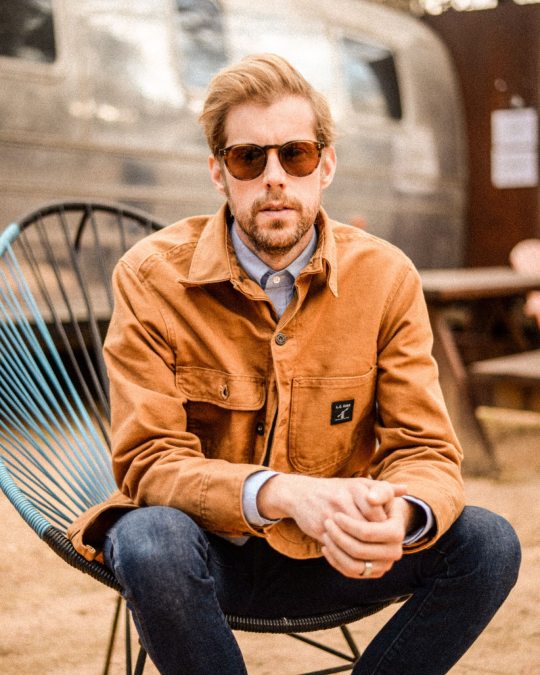
Photo by Joe Ortega
What’s there to say about Andrew McMahon that hasn’t already been said? With not one, not two but three successful musical acts under his belt, the man is a musical phenom. Not to mention, with the help of his Dear Jack Foundation – which raises money for kids and young adults with cancer – McMahon is also quite the philanthropist as well.
Now, currently stuck in the middle of a messy global shut down, what’s a guy like McMahon supposed to do? Well, how about throw an intimate three night drive-in concert experience to not only help people forget about the world’s problems but also raise money for a good cause.
Taking place in Southern California, McMahon and his bandmates put together three socially distant nights fans will never forget as they performed Jack’s Mannequin’s beloved Everything In Transit in full as well as favorites from both Something Corporate and Andrew McMahon in the Wilderness.
Exploring what it was like to play a rare drive-in concert during unprecedented times while also celebrating 15 years of his alt-indie breakout LP, we spoke with McMahon to get his thoughts on the weekend that was.
To see what the talented singer-songwriter had to say and check out some photos from the show by Noise contributor Moe Horta, be sure to look below. Afterward, for more from McMahon (including his new single “Get On My Wave”) head here.
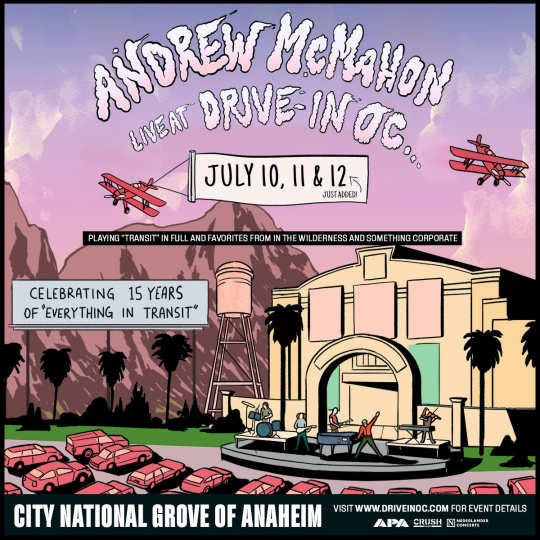
Looking at your Instagram it appears you’re in the desert getting some well deserved rest after a long weekend. Were you pretty burnt out after those three shows? And were you even planning on doing three?
Andrew McMahon: I mean, I wouldn’t say I’m burnt out. What I will say is that just because of the nature of what we were trying to accomplish – and obviously, I feel like the stakes were much higher in the sense that there are really so few outlets for entertainers to entertain and for people to be entertained – I think the priorities of making sure we were doing it in a way that was safe for the fans, the band and crew and a lot of what we were deploying at the time was new technology. I think, if anything else, it was just a lot of added stress. I tend to stress out and get nervous about all shows whether they’re the most turnkey [shows] I’ve done a million times before. So I think the extra layers of like sort of “reappearing” in society in such a public way after kind of being hermetically sealed and quarantined [laughs] it was a lot but it ended up being so much fun and really cathartic. And yeah, we got to add the third show because the first two sold out so quickly and we added the live stream because we really wanted other people to be able to participate. It was a whirlwind to say the least but a lot of fun.
Is it interesting to think, looking back on this years from now, you were one of the first artists to do this drive-in concert idea? It’s almost historic in a way.
I mean, in all honesty, we saw this going on in a couple of countries in Europe currently in the pandemic that had been hit first. So you know, for me, sure there’s some strategic benefit to being one of the first to market with something like this. I think it’s exciting to be a part of something new and trying to bring something to people who have been missing the live experience. But I mean, I think the bigger thing for me and for all of us involved was like, one, this is what we do. We want to entertain people. And for the promoter who we did this with, they have these venues and have these spaces that aren’t being used. And I think the coolest thing about it was just that we really approached it as a family or community event. It wasn’t like a typical concert where, you know, even going into it, it didn’t look like it was going to make much money at all because of how expensive it was to put it together. But everybody sort of did it because we wanted to be a part of something unique and create some weird little artifact of this time that says, “Hey, we still kind of stepped up and tried to do our best version of what we could do in bringing entertainment.”
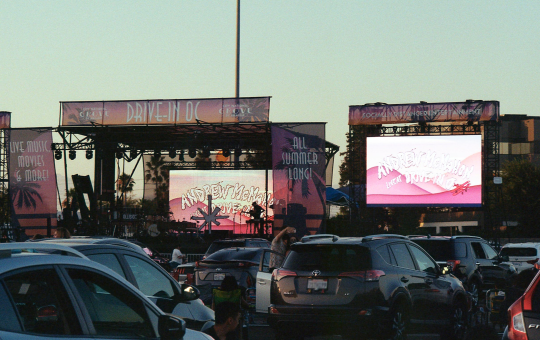
Compared to all the other shows you’ve played in your career, which surely there’s probably been some unique ones, how did this feel?
Look, I’ll say this: You sort of grade it on a curve, right? I mean, because we’ve all been without proper platforms to do shows it’s obviously different looking out at the massively spaced out parking lot and people – we were fortunate with our drive-in, we really decided and committed going forward we won’t do a drive-in where it isn’t built so that people can safely social distance and watch outside of their cars because I think the model where you put people inside a car is pretty rough and they can’t get out. So we did at least have the benefit of seeing faces in their own little socially distant car parking spaces next to the car. We did get that connection with fans. I’d say from the first show we did to the third show, we were constantly [updating things] that by the second night we added more speakers throughout the parking lots. We felt like we wanted to make sure that if people for some reason didn’t have their FM radios turned on, which is where most of the signal from the show came from, that there was still a good mix coming their way. And I’d say by the third night that we played, it actually felt really blissful and beautiful.
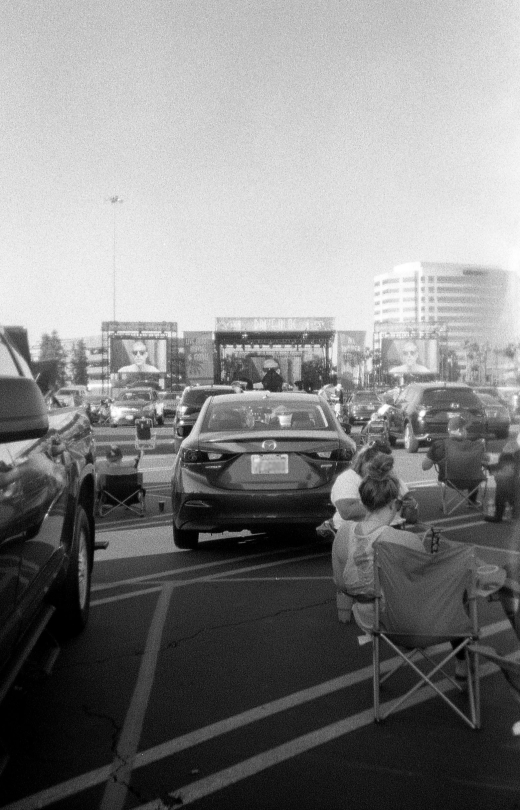
During the show, you mentioned you had your high school prom right around the corner of the venue. As if things weren’t surreal enough considering the circumstances, what was it like feeling that experience as well? Must have been pretty full-circle in a way.
So the building, The Grove, is effectively the venue we played – the parking lot of The Grove. And yeah, The Grove used to be called Tinsel Town and it was home to my senior prom. So you know, when we were trying to figure out how to safely sort of rehearse with the band – we all got tested, then we all rehearsed on the stage at The Grove. So we did all of our prep for the show on the theater where I danced with my prom date. That for me, just as a side note, I was able to do something in the community where I was raised and saw familiar faces. And also to know that for a solid few weeks we were able to employ a lot of people in the town from the town where I grew up, it felt like a big win all around and something that we’re all really proud of.
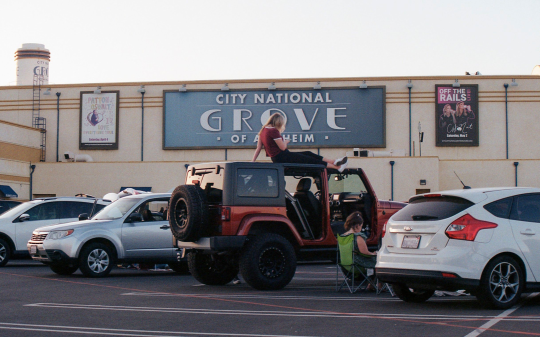
Speaking of where you grew up, were drive-in movies something you experienced a lot as a kid? For some people, it seems like the concept of going to a drive-in movie theater is new to them.
I mean, I’ve never been to a drive-in in my whole life. I think I’ve passed a few. I’m a big fan of cross-country road trips so I’ve done a bunch of those and I always found it nostalgic and wild when you see these sort of ramshackle drive-in movie theaters that don’t really have movies anymore but still have kind of beat-up screens out there. So I mean, I feel like it’s an interesting symbol to re-enter the vernacular of our culture that all of a sudden this dying method of entertainment is actually one of the few safe ways where people can gather right now. I think it’s a little ironic that it happens to be in a format that has been long considered obsolete.
Yeah, it’s interesting that in the time with so much technology, something that’s been around forever and is pretty outdated is what’s helping save the music industry.
You know, not to get too philosophical about it in the pandemic, but I think there has been a certain level of full-circle just as far as people needing to take the time to reconnect with family and slow down a little bit. Because obviously, you can’t be in an office for a million hours a day. There’s restrictions on work and whatnot. I do think there’s, at least for me and my family, an education in like, “Ah, maybe we can live a little simpler.” You know, maybe we don’t need to be out at restaurants all the time. I appreciate the fact that at some point we’ll be able to start doing that again but I think a lot of our culture is coming full-circle and asking some questions about how we spend our time and how we will spend our time when this is over.
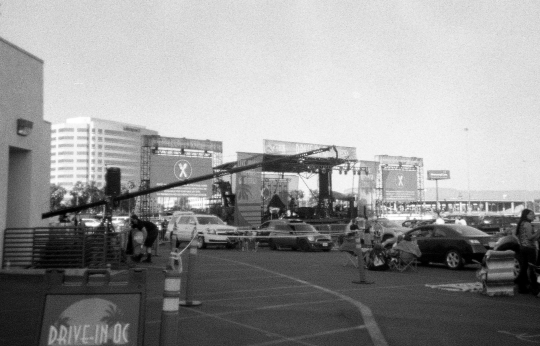
Talking more about your life feeling a little full-circle, during these shows you celebrated 15 years of Everything In Transit. What was it like being where we are in the world in 2020 to go back to 2005 and process some of those songs again?
It’s wild. You know, life couldn’t be in some degree more different than it is. I mean, the sort of subject of that record was my wife, who at the time, we were separated. … Transit especially, I’ve always held in this strange place within my own personal history. It really is, in so many ways, a stamp in the middle of a road where I could have gone left or I could have gone right. You know, all of a sudden, it’s like here I am broken up and I’m sick then my wife and I are together and my life goes into a completely different direction. So when I sing those songs, it’s almost like revisiting [this moment] standing somewhere in the middle of a fork in the road where you’re sort of forced to go one direction and you thought you were going to go another.
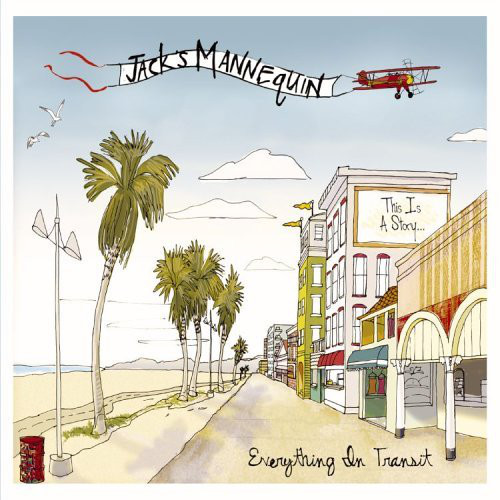
2005 was obviously a pretty impactful year for you for a lot of different reasons. Is it hard or a little weird to celebrate a record that came out the same year you got your cancer diagnosis?
You know, to say there isn’t some level of complexity obviously would be a lie. It’s interesting for me. Everything In Transit, even though it got really wrapped up in my illness and there seems to be some sort of almost prophetic words written throughout it about hospitals and doctors and things, [those were written] long before I was even living in a hospital dealing with that stuff. I also really look at that record and sort of the naivety and the hope that’s written into it. The fact that it really was the thing I was most motivated to, not only to get heard, but to be able to play live at some point, I feel a bit of a debt of gratitude to that album for me getting better quickly because it was really so much at the heart of my survival. It’s like, “I love this record so much, I want people to hear it” so I think I see that side of it a lot more. I [also] see the love story in it more than anything because it really is this moment that all of us go though as people when we end up really falling in love with someone. You know, sometimes you wonder if it’s too good to be true and then blow it up to see if you’re right. In my case, whatever happened to me put me back on the right road and I ended up getting married with the girl who I wrote that record about. So I think I see those parts more than the cancer or the complications that followed.
Talking about the performance of the record, which songs were most excited to bring back into the setlist again?
Oh man. You know, even when Transit was out, we really didn’t play “Into the Airwaves” a lot. If you actually got the original version of the record, “Airwaves” was a bonus track back when you could have a bonus track, you know what I mean? Like, we just tagged it on to the end of the record. If you were willing to listen for a minute, then that song would play. And I kind of treated it that way because it felt like an epilogue more than a part of the body of the main story. So we sort of treated it like that live. [During the drive-in shows] we did a version of it that was just like an acoustic rendition of the song. And to me, that ended up being this really beautiful moment that we hadn’t put a ton of thought into but we’re just like, “Let’s do one of these tunes a little bit different than you would hear it on the album” and it became one of my favorite parts of all three nights. And the words, “don’t panic, there’s simply no need, it’s going to be a hard day” I think hit me a little bit harder and perhaps the audience a little bit harder too just knowing that we are in a moment where it’s pretty easy to let the fear take the wheel in this particular moment in time.
That’s very true. Speaking of that rendition, was it challenging to put together considering you probably had pretty limited practice time?
Well, I mean, a couple things to that: One, when we agreed to do the show, we made it imperative that all of us would be tested before we got on stage together and that we would all quarantine during the process of putting the shows on. So we were still more or less masked when we weren’t singing but we all knew we were safe. So that was helpful but we didn’t truly have a ton of time to practice. I think in all, the whole band really only had four days to pull together the record and we also had Morgan who was a new addition learning all of those songs to play for the first time at that show [laughs]. My second point being that I’m really blessed to have some very incredible musicians that I’ve worked with on and off for decades now. And you know, if I were to say let’s work on an acoustic version of this song, Bobby would be sending me guitar riffs and things that he thinks would work before we even got to practice and we would just sit down and feel it out. I think that was what was fun about what I call the “ramble song” during the set. We also did another version of “Love and Great Buildings” on a couple of the show nights and with both of those, I think it turned out really cool. They were just meant to be like, “Hey, pick up your guitar and go with the changes. Let’s see how it works.” And it turned out really cool I thought.
Yeah, it came out great and the fans definitely enjoyed it too. It is crazy to think that this show was such a unique moment in time that might not ever happen again?
Yeah I mean, that’s how we intended it. You know, I think when we started working on the show as a concept is was like, “We’re gonna do this thing, and there’s a number of reasons to do it, but the number one reason was let’s create a hopeful, positive memory in the middle of a time where people are feeling like they’re missing out on a lot and things are a little out of control. Let’s give people some control, give them a place to be with other people that’s safe and just smile and hang out.” There hasn’t been a lot of that in my life. You know, I get that with my family but I’m not really in a position to go sit anywhere with 2000 people and be a part of a common experience. I felt like that was really, if anything, the impetus of doing this whole thing. Just let’s give a lot of people a place to be safe.
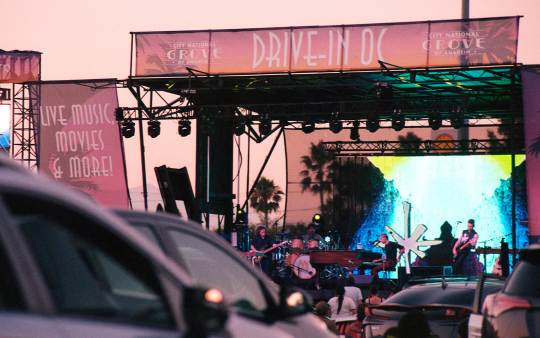
Adding to that hopeful and positive note, portions of the tickets sold went to the Dear Jack Foundation which you guys raised a lot of money for. How’d it feel knowing you’re not only giving your fans some joy but also helping the foundation as well?
Yeah, I’ll be perfectly honest: Looking around at what’s going on with the economics of people, nonprofits are getting hit really hard right now. It’s a very tough time to raise money because I think, rightfully so, everybody’s holding on to their money waiting to see how long they’re gonna have to save to get through this thing. So we knew really early on that there would be a component of giving back to the charity via ticket sales and the live stream. What I think blew us away was that we didn’t really anticipate the live stream being as big of a thing as it was. We were like, “Oh yeah, maybe a thousand people will watch.” [Instead], thousands of people showed up for the live stream and that generated a really good amount for Dear Jack. And I’m going to kind of keep doing a version of that throughout the year. Like we’re launching the 250k Challenge, which is like our big fan-centric fundraiser we do every year in the fall, so that’s gonna launch [in August]. We’re gonna do some fundraising over Instagram Live and have donate shows and things like that. You know, anything I can do to keep the lights on for Dear Jack is important in terms of the work we’re doing there and the work that still needs to be done regardless of what’s going on.
That’s really awesome. Obviously, no one really knows what the future holds but in terms of your music, do you think the pandemic will impact some of the songs you’re writing?
It’s hard to say. I’ll be honest: Since this pandemic began, I’ve actually been working on a book project primarily. So most of the day, I spend writing on a laptop just writing words. And I had written tons [of music] leading up to the pandemic that I was so excited about and doing a lot of work with an artist named King Tuff who’s just incredible. He’s like this rock artist – really talented, great songwriter – and we’re kind of this weird mismatched pair as far as if you put us on paper. You’d be like, “I’m not sure if this is a record I’d pick up.” But the songs we were writing together before the pandemic, I was so excited by. It just felt really fresh. Hysterically, it felt, if anything, more like a great summer record. It’s not that the lyrics aren’t very literary or that they’re not deep, but there’s just a sound to it that was a little bit effortless. In a way, I think if those songs were released during this pandemic, they would almost be released more as an antidote to it rather than a reflection specifically of what it feels like. Cause I’m not writing a lot of music [right now]. I’m writing words. I’m writing this book and then I’m revisiting the songs that I wrote that are supposed to come out but haven’t yet [laughs]. It’ll be interesting but I certainly imagine once I actually get down behind my piano and start writing songs, it’s possible that [writing about] the effects of what we’re all going through would only be natural. But at the same time, I’ve also found when, at least the times when things feel hopeless, I end up latching on to the concept of hope and what is the other side of that coin to keep me out of it. Rather than going dark and deep into it and not giving myself the good medicine that I could be getting out of a song.







